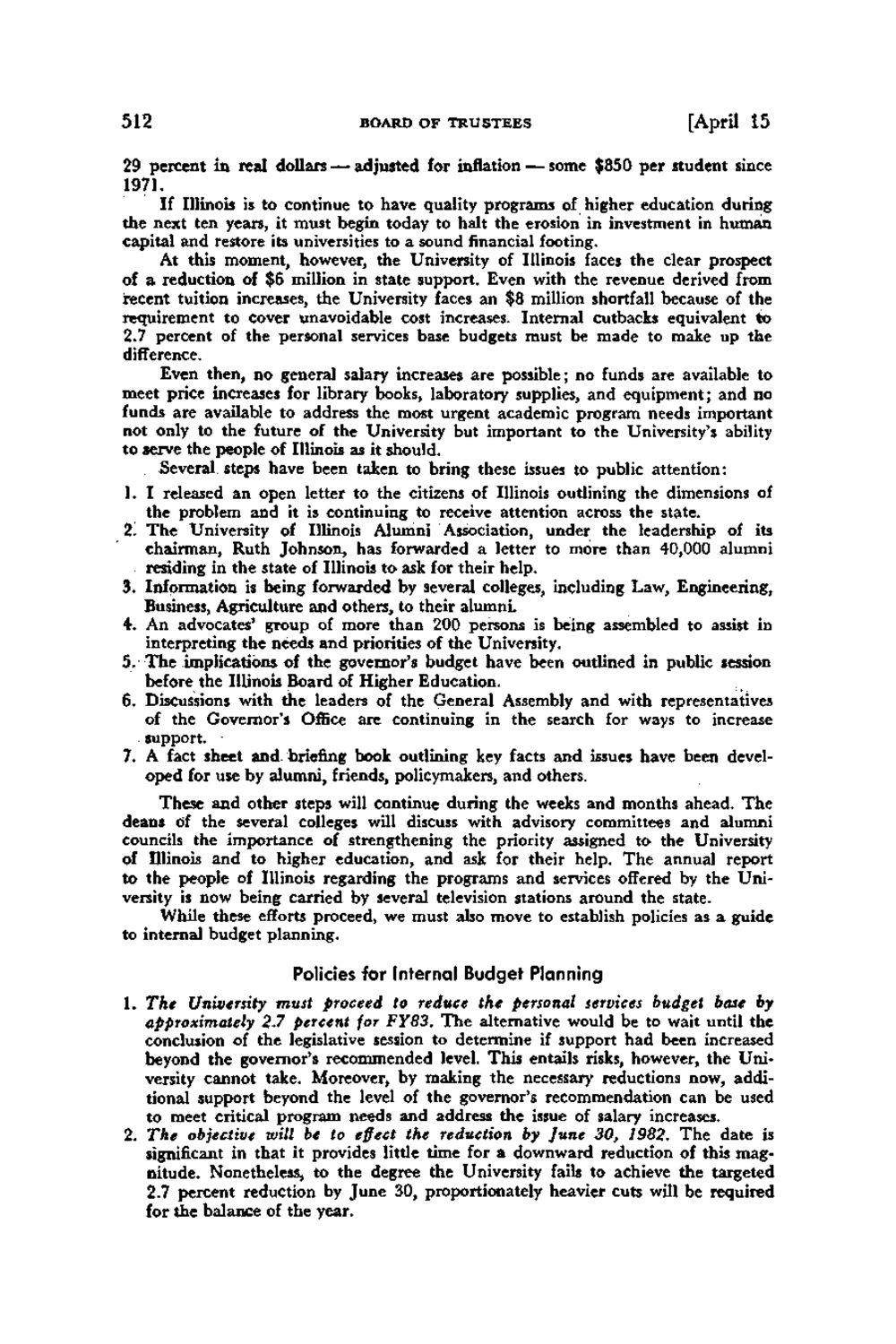| |
| |
Caption: Board of Trustees Minutes - 1982
This is a reduced-resolution page image for fast online browsing.

EXTRACTED TEXT FROM PAGE:
512 BOARD OF TRUSTEES [April 15 29 percent in real dollars — adjusted for inflation — some $850 per student since 1971. If Illinois is to continue to have quality programs of higher education during the next ten years, it must begin today to halt the erosion in investment in human capital and restore its universities to a sound financial footing. At this moment, however, the University of Illinois faces the clear prospect of a reduction of $6 million in state support. Even with the revenue derived from recent tuition increases, the University faces an $8 million shortfall because of the requirement to cover unavoidable cost increases. Internal cutbacks equivalent to 2.7 percent of the personal services base budgets must be made to make up the difference. Even then, no general salary increases are possible; no funds are available to meet price increases for library books, laboratory supplies, and equipment; and no funds are available to address the most urgent academic program needs important not only to the future of the University but important to the University's ability to serve the people of Illinois as it should. Several steps have been taken to bring these issues to public attention: 1. I released an open letter to the citizens of Illinois outlining the dimensions of the problem and it is continuing to receive attention across the state. 2. The University of Illinois Alumni Association, under the leadership of its chairman, Ruth Johnson, has forwarded a letter to more than 40,000 alumni residing in the state of Illinois to ask for their help. 3. Information is being forwarded by several colleges, including Law, Engineering, Business, Agriculture and others, to their alumni. 4. An advocates' group of more than 200 persons is being assembled to assist in interpreting the needs and priorities of the University. 5. The implications of the governor's budget have been outlined in public session before the Illinois Board of Higher Education. 6. Discussions with the leaders of the General Assembly and with representatives of the Governor's Office are continuing in the search for ways to increase support. 7. A fact sheet and briefing book outlining key facts and issues have been developed for use by alumni, friends, policymakers, and others. These and other steps will continue during the weeks and months ahead. The deans of the several colleges will discuss with advisory committees and alumni councils the importance of strengthening the priority assigned to the University of Illinois and to higher education, and ask for their help. The annual report to the people of Illinois regarding the programs and services offered by the University is now being carried by several television stations around the state. While these efforts proceed, we must also move to establish policies as a guide to internal budget planning. Policies for Internal Budget Planning 1. The University must proceed to reduce the personal services budget base by approximately 2.7 percent for FY83. The alternative would be to wait until the conclusion of the legislative session to determine if support had been increased beyond the governor's recommended level. This entails risks, however, the University cannot take. Moreover, by making the necessary reductions now, additional support beyond the level of the governor's recommendation can be used to meet critical program needs and address the issue of salary increases. 2. The objective will be to effect the reduction by June 30, 1982. The date is significant in that it provides little time for a downward reduction of this magnitude. Nonetheless, to the degree the University fails to achieve the targeted 2.7 percent reduction by June 30, proportionately heavier cuts will be required for the balance of the year.
| |